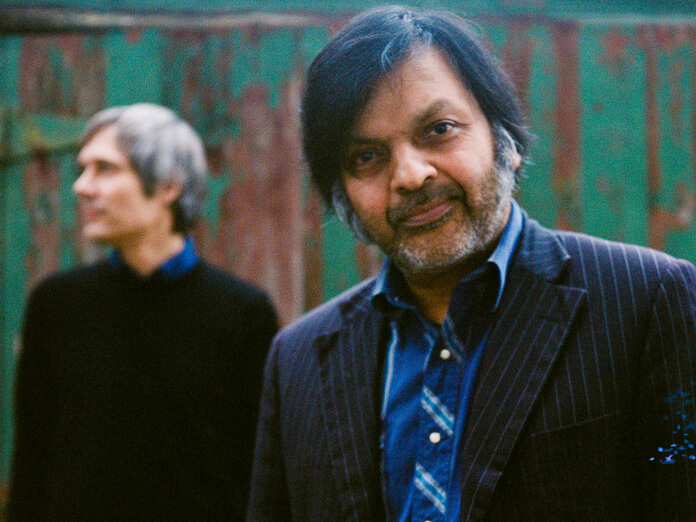When Tjinder Singh’s father told him, “There will come a day when they want to chuck you out,” these words had a profound bearing on the person he would become. “I’ve always lived with that in my background. This has made the group political,” he said in a recent interview with Snack, be...
When Tjinder Singh’s father told him, “There will come a day when they want to chuck you out,” these words had a profound bearing on the person he would become. “I’ve always lived with that in my background. This has made the group political,” he said in a recent interview with Snack, before adding: “It’s always nice to have something other than love to write about.”
While England Is A Garden is by no means Cornershop’s Brexit album – the band have addressed issues of race, immigration and multiculturalism since they first appeared at the start of the 1990s – it was written and recorded while the mad fog of Brexit descended, and now that a divided UK has formally left the EU, the band’s rather glorious seventh album does carry a certain weight, a poignancy perhaps not immediately apparent in the freewheeling rock’n’roll being liberally doled out here. Is the day that Singh’s father warned him about inching ever closer or is it already here, fast-tracked by Brexit into reality? Depending how you voted, you’ll know the answer.
You don’t need to look far to note Singh’s views on the issue – “Brexit was always about racism,” he wrote in a recent tweet, while the band’s “Demon Is A Monster” instrumental is the opening theme of the popular Remainiacs podcast – and although we’re a long way from the band who set fire to a poster of Morrissey in 1992 at the beginning of their career, calling out the singer’s views in a prescient stunt, Brexit appears to have sanctioned the kind of nationalism that Cornershop warned us about. “Baby, I can see it in Enoch’s eyes,” Singh sang on “Roof Rack” back in 1995. “Because breaking these borders will bring new orders.” England might still be a garden, but it’s choked by weeds.
Rather than dwell on differences, this latest set sees Cornershop focusing on the things that bring people together. Much like the work of Jeremy Deller, whose playful art explores ideas of cultural difference and community by drawing on seemingly disparate elements to find common unifying threads, this record uses Singh’s familiar tropes – the Black Country, heavy metal, Marc Bolan, empire, songs that scan like ’70s sitcoms – to paint an eccentric picture of modern-day Englishness. Of course, this is what Cornershop have always done, but the last time we heard from them in any meaningful way was more than a decade ago, in 2009, with Judy Sucks A Lemon For Breakfast, a mixed bag that arrived seven years after the excellent Handcream For A Generation (a record that featured both Noel Gallagher and Oasis bassist Guigsy, to illustrate how long ago that was).
There have been other LPs – a collaboration with the Indian singer Bubbley Kaur in 2011 and, in 2015, Hold On It’s Easy, a lounge version of their shambolic debut, Hold On It Hurts – but Cornershop’s return resonates this time not just because of the pitiful state of the nation but because they’ve made such a joyous album, one that doesn’t wander off along unnecessary tangents and keeps their indulgence in check. Singh today is something of the elder statesman, which suits the classy Kinksian soul of “St Marie Under Canon” – “the story of charge and attack” he sings – and the hard Memphis blues of “No Rock: Save In Roll” where he riffs on his Wolverhampton roots, repping the Black Country as the place that forged heavy metal.
It’s tempting to accuse Singh and guitarist Ben Ayres of ripping off Marc Bolan, but you soon realise (or remember) that this glam grind and righteous groove is the Cornershop house style. It’s there in the endless boogie of “I’m A Wooden Soldier”, a number violated by a ripe Moog squiggle in the manner of Denim’s Back In Denim, and frames “The Cash Money” and “Highly Amplified”, the latter laced with sitar and flute.
Throughout the record Singh sings of combat and confrontation, of cultures clashing and historical battles. On the sugar-coated Velvets romp “Everywhere That Wog Army Roam” we learn that “policeman follow them” wherever they go. Singh has long used “wog” in his material but in this current climate the word feels especially charged. The album closes with a nine-minute devotional jam called “The Holy Name”, where Singh and a school choir sing of “nothing to lose but all to gain” as an agreeable cacophony bubbles up. It’s a tremendous note to end on. Cornershop are back, then, better than ever, and now there’s every reason to pay attention.



